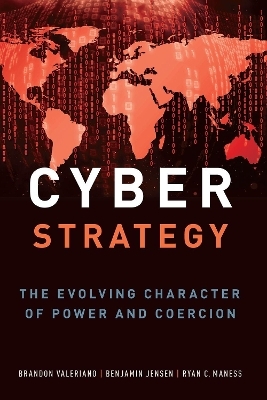
Cyber Strategy
Oxford University Press Inc (Verlag)
978-0-19-752378-0 (ISBN)
Some pundits claim cyber weaponry is the most important military innovation in decades, a transformative new technology that promises a paralyzing first-strike advantage difficult for opponents to deter. Yet, what is cyber strategy? How do actors use cyber capabilities to achieve a position of advantage against rival states?
This book examines the emerging art of cyber strategy and its integration as part of a larger approach to coercion by states in the international system between 2000 and 2014. To this end, the book establishes a theoretical framework in the coercion literature for evaluating the efficacy of cyber operations. Cyber coercion represents the use of manipulation, denial, and punishment strategies in the digital frontier to achieve some strategic end. As a contemporary form of covert action and political warfare, cyber operations rarely produce concessions and tend to achieve only limited, signaling objectives. When cyber operations do produce concessions between rival states, they tend to be part of a larger integrated coercive strategy that combines network intrusions with other traditional forms of statecraft such as military threats, economic sanctions, and diplomacy. The books finds that cyber operations rarely produce concessions in isolation. They are additive instruments that complement traditional statecraft and coercive diplomacy.
The book combines an analysis of cyber exchanges between rival states and broader event data on political, military, and economic interactions with case studies on the leading cyber powers: Russia, China, and the United States. The authors investigate cyber strategies in their integrated and isolated contexts, demonstrating that they are useful for maximizing informational asymmetries and disruptions, and thus are important, but limited coercive tools. This empirical foundation allows the authors to explore how leading actors employ cyber strategy and the implications for international relations in the 21st century. While most military plans involving cyber attributes remain highly classified, the authors piece together strategies based on observations of attacks over time and through the policy discussion in unclassified space. The result will be the first broad evaluation of the efficacy of various strategic options in a digital world.
Brandon Valeriano is the Donald Bren Chair of Armed Conflict at the Marine Corps University and a Senior Fellow at the Niskanen Center. He has published five books and dozens of articles in outlets including The Washington Post, Journal of Politics, and International Studies Quarterly. His ongoing research explores documenting cyber events, biological examinations of cyber threat, and repression in cyberspace. Benjamin Jensen is an Associate Professor at Marine Corps University and a Scholar-in-Residence at American University, School of International Service. His research explores the changing character of conflict as it relates to strategy and military innovation, themes explored in his first book, Forging the Sword: Doctrinal Change in the U.S. Army (Stanford University Press 2016) and his "Next War" column at War on the Rocks. Ryan C. Maness is an Assistant Professor in the Defense Analysis Department at the Naval Postgraduate School. His research includes cyber conflict, cyber security, cyber coercion, cyber strategies, information warfare, Russian foreign policy, American foreign policy, and conflict-cooperation dynamics between states using Big Data. He is coauthor of Russia's Coercive Diplomacy: Energy, Cyber and Maritime Policy as New Sources of Power (Palgrave Macmillan, 2015), and Cyber War versus Cyber Realities: Cyber Conflict in the International System (Oxford University Press, 2015).
Preface
Acknowledgements
Chapter 1 - Introduction: Are Cyber Strategies Coercive?
Chapter 2 - How Rival States Employ Cyber Strategy: Disruption, Espionage, and Degradation
Chapter 3 - The Correlates of Cyber Strategy
Chapter 4 - Cyber Coercion as a Combined Strategy
Chapter 5 - Commissars and Crooks: Russian Cyber Coercion
Chapter 6 - China and the Technology Gap: Chinese Strategic Behavior in Cyberspace
Chapter 7 - The United States: The Cyber Reconnaissance-Strike Complex
Chapter 8 - Conclusion: Cyber Political Warfare with Limited Effects
Appendix 1: The Dyadic Cyber Incident and Dispute Dataset Version 1.1
Appendix 2: Cyber Strategy Summary
Appendix 3: The Dyadic Cyber Incident and Dispute Dataset (DCID), version 1.1, summarized version
Notes
Bibliography
Index
| Erscheinungsdatum | 25.03.2020 |
|---|---|
| Verlagsort | New York |
| Sprache | englisch |
| Maße | 156 x 234 mm |
| Gewicht | 494 g |
| Themenwelt | Informatik ► Netzwerke ► Sicherheit / Firewall |
| Sozialwissenschaften ► Politik / Verwaltung ► Europäische / Internationale Politik | |
| Sozialwissenschaften ► Politik / Verwaltung ► Politische Theorie | |
| ISBN-10 | 0-19-752378-1 / 0197523781 |
| ISBN-13 | 978-0-19-752378-0 / 9780197523780 |
| Zustand | Neuware |
| Haben Sie eine Frage zum Produkt? |
aus dem Bereich


